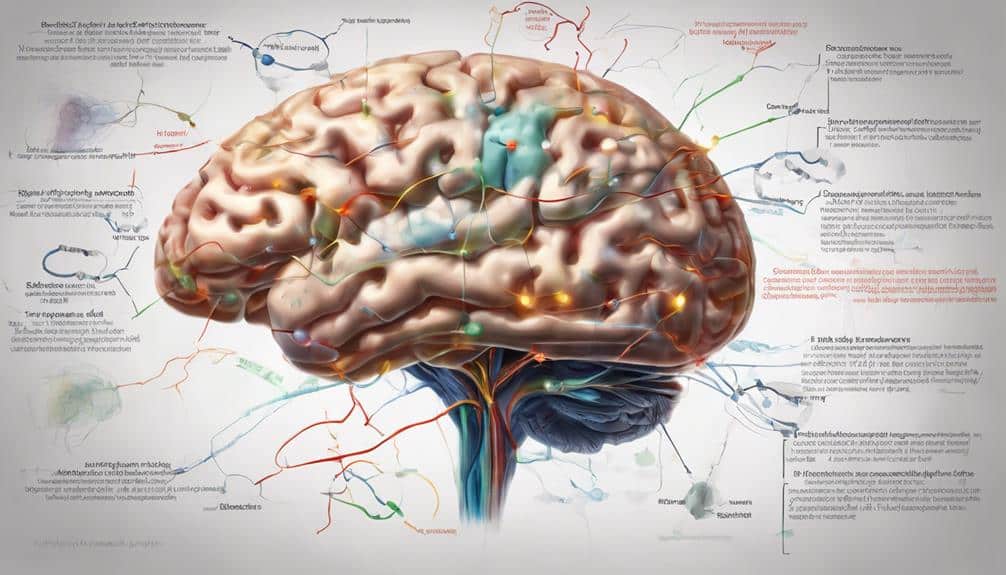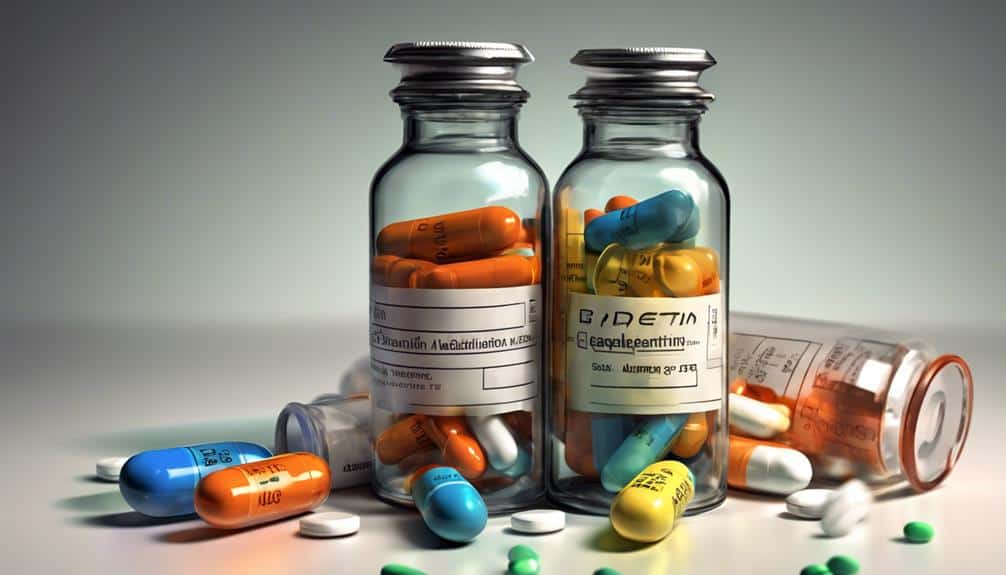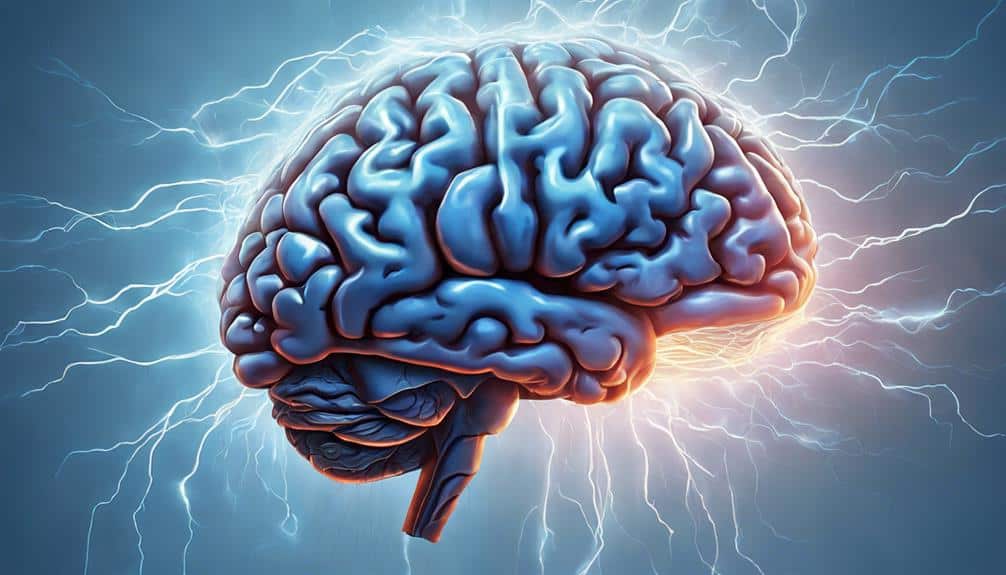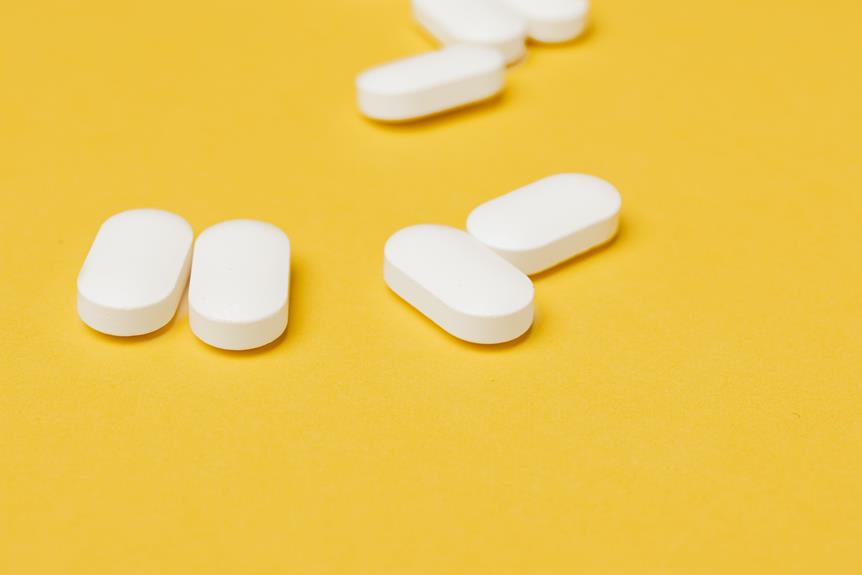Gabapentin Adhd
As a writer exploring the potential of Gabapentin in ADHD treatment, I came across an intriguing case study involving a preadolescent with comorbid ADHD and bipolar disorder II. The use of Gabapentin alongside methylphenidate resulted in noticeable improvements in mood symptoms.
The case study hints at a new avenue for managing ADHD, but what further insights could research uncover about Gabapentin's role in treating ADHD symptoms?
Key Takeaways
- Gabapentin shows promise in managing ADHD symptoms in children.
- Gabapentin has a favorable safety profile for ADHD treatment.
- Gabapentin may benefit those with comorbid ADHD and bipolar disorder.
- Gabapentin can be used as adjunctive therapy with methylphenidate for improved outcomes.
Gabapentin: Overview and Mechanism of Action

Gabapentin, an anticonvulsant medication with an uncertain mechanism of action, has been a notable addition to the pharmaceutical market since its introduction in the United States in 1993. Although mainly used in adults for conditions like refractory partial epilepsy and bipolar disorder, its potential in treating ADHD in children and adolescents is a subject of interest.
The exact mechanism through which gabapentin exerts its effects remains elusive, but its pharmacokinetics and safety profile have been favorable. In adults, gabapentin has shown promise in managing mood symptoms in bipolar disorder, prompting exploration for its efficacy in youths with comorbid conditions like ADHD and bipolar disorder.
However, the literature on controlled studies evaluating gabapentin's use in children and adolescents, specifically for ADHD and bipolar disorder, is limited. Understanding the properties of gabapentin and elucidating its potential antimanic or antidepressant effects are important steps towards effectively managing comorbid conditions in young individuals.
Further research is needed to establish the efficacy and safety of gabapentin in this population, shedding light on its role as a potential treatment option for ADHD and bipolar disorder.
Gabapentin Vs. Traditional ADHD Medications

When comparing Gabapentin to traditional ADHD medications, it's essential to assess their effectiveness and side effects rigorously. Understanding how Gabapentin fares crucial symptom improvement and tolerability compared to standard ADHD treatments is critical for informed decision-making.
Analyzing these factors can provide valuable insights into the potential role of Gabapentin managing ADHD and comorbid conditions.
Gabapentin Effectiveness Comparison
Comparing gabapentin's effectiveness in managing ADHD to traditional medications like stimulants requires thorough examination of existing research and clinical data.
- Gabapentin's efficacy in ADHD treatment lacks extensive study compared to traditional medications.
- Limited direct comparisons exist between gabapentin and stimulants like methylphenidate in managing ADHD symptoms.
- Traditional stimulants are the primary treatment for ADHD due to their established efficacy, unlike gabapentin.
- The differing mechanism of action between gabapentin and stimulants may influence their effectiveness in managing ADHD symptoms.
While gabapentin shows promise in treating certain psychiatric disorders, its role in ADHD management, especially when compared to standard treatments, necessitates further investigation to determine its place in the therapeutic landscape.
Side Effects Assessment
In examining side effects between gabapentin and traditional ADHD medications like stimulants, it's evident that gabapentin presents a favorable safety profile with minimal adverse effects compared to its counterparts.
Traditional ADHD medications, specifically stimulants, often lead to common side effects such as appetite suppression, sleep disturbances, and the potential for abuse. In contrast, gabapentin, a non-stimulant, doesn't carry the risk of abuse or dependence associated with stimulants.
While gabapentin may cause mild side effects like dizziness, drowsiness, and fatigue, these are generally well-tolerated. Considering the safety profile, gabapentin emerges as a promising alternative for individuals, especially children, with ADHD who may not tolerate or have contraindications to traditional stimulant medications.
This underscores the importance of carefully evaluating side effects when choosing the most suitable treatment for ADHD.
Gabapentin Dosage for ADHD Treatment

For children undergoing ADHD treatment, the typical starting dosage of gabapentin is 200 mg per day. When considering gabapentin dosage for ADHD treatment, several key points should be kept in mind:
- Adjunct Therapy: Gabapentin is often used alongside medications like methylphenidate to help manage ADHD symptoms effectively.
- Dosage Adjustments: Dosage adjustments may be necessary based on the individual's response to gabapentin and the severity of their ADHD symptoms.
- Improvement in Mood Symptoms: Gabapentin has shown promise in enhancing mood symptoms in children with ADHD and comorbid bipolar disorder.
- Regular Monitoring: It's crucial to conduct regular monitoring and follow-ups to evaluate the efficacy and tolerability of gabapentin in the treatment of ADHD.
Considering these factors and working closely with healthcare providers can help optimize the use of gabapentin in managing ADHD symptoms in children. Regular assessment and potential adjustments are essential for tailoring treatment to each child's specific needs.
Efficacy of Gabapentin in Managing ADHD Symptoms

Having demonstrated promise in managing ADHD symptoms in children and adolescents, gabapentin, an anticonvulsant drug released, shows potential as an adjunctive therapy for enhancing overall ADHD management in youths. While the exact mechanism of how gabapentin treats ADHD isn't fully understood, its favorable safety profile is remarkable.
Controlled studies are needed to determine the specific efficacy of gabapentin for ADHD in youths. Gabapentin has been effective in treating adults with bipolar disorder, hinting at potential benefits for individuals with both ADHD and bipolar disorder.
When used alongside medications like methylphenidate, gabapentin may help improve mood symptoms and overall ADHD management. This suggests gabapentin could be a valuable addition to the treatment arsenal for individuals with ADHD, especially those with comorbid conditions like bipolar disorder.
Further research is essential to fully grasp the extent of gabapentin's impact on hyperactivity, mood symptoms, and comorbid ADHD and bipolar disorder in children.
Common Side Effects of Gabapentin for ADHD

Occasionally, individuals prescribed gabapentin for ADHD may experience common side effects that include dizziness, drowsiness, and fatigue. When considering the use of gabapentin for ADHD, it's essential to be aware of the potential side effects that may arise. Based on studies, the rates of comorbid ADHD and common side effects of gabapentin are well documented.
- Gastrointestinal issues: Nausea, vomiting, and diarrhea are among the reported side effects that individuals may encounter while taking gabapentin for ADHD.
- Weight gain: Some individuals using gabapentin for ADHD may experience weight gain and swelling in the extremities as adverse effects of the medication.
- Mood changes: Gabapentin can lead to mood changes such as irritability or agitation in individuals with ADHD.
- Coordination and concentration: Users of gabapentin for ADHD may face challenges with coordination and concentration, impacting their daily activities.
Gabapentin as a Complementary Therapy for ADHD

In clinical practice, gabapentin has shown promising potential as a complementary therapy for ADHD, particularly in cases of comorbid conditions such as bipolar disorder. A case study involving a preadolescent with ADHD and bipolar disorder ranging received gabapentin at a dose of 200 mg/day alongside methylphenidate for ADHD management. The patient exhibited significant improvement in mood symptoms within three weeks of initiating gabapentin treatment, suggesting its potential as an adjunctive therapy in refractory cases.
Gabapentin's favorable safety profile and potential mood stabilizing properties make it a promising option for addressing ADHD and bipolar disorders in children and adolescents. However, to establish its efficacy and safety conclusively, controlled studies specifically focusing on gabapentin for bipolar disorders in child and adolescent psychiatric populations are warranted.
Hence, further research is needed to elucidate the role of gabapentin in improving mood symptoms and managing ADHD symptoms in individuals with comorbid bipolar disorder.
Gabapentin: Future Research and Implications

As we look to the future of ADHD treatment, exploring the potential of gabapentin for its neurological effects becomes paramount. Investigating its role in managing ADHD symptoms and its impact on mood stability is essential for enhancing therapeutic strategies.
Understanding the implications of gabapentin in youths with ADHD and comorbid bipolar disorder could offer valuable insights into its efficacy and safety profile.
Potential ADHD Treatment
Exploring the potential of gabapentin as a treatment for ADHD in children and adolescents stems from its proven efficacy in adults with bipolar disorder, prompting further investigation into its applicability for younger populations.
- Gabapentin's history of being successfully used in adults with bipolar disorder opens doors for potential treatment in ADHD.
- Its classification among antiepileptic drugs in bipolar disorder treatment suggests possible antimanic and mood-stabilizing effects that could benefit individuals with ADHD.
- Essential studies are critical to determine the efficacy and safety of gabapentin specifically for ADHD in youths, emphasizing evidence-based practices.
- Considering the high comorbidity between ADHD and bipolar disorder, ranging from 22% to 90%, exploring gabapentin's potential in managing both conditions could lead to improved patient care outcomes.
Neurological Effects Study
To investigate the neurological effects of gabapentin in ADHD, a thorough study focusing on its impact on attention, behavior, and mood stabilization is essential. Understanding how gabapentin influences these core aspects of attention-deficient hyperactivity disorder (ADHD) can provide valuable insights into its potential as a treatment option.
Exploring the synergistic effects of gabapentin when used in conjunction with other medications for ADHD could lead to more effective therapeutic interventions, especially for individuals with comorbid conditions. It's important to assess the long-term safety and efficacy of gabapentin, particularly in pediatric populations, to inform evidence-based practices.
Delving into the neurobiological mechanisms through which gabapentin interacts with ADHD symptoms and neural pathways may pave the way for targeted and personalized treatment strategies.
Frequently Asked Questions
Can GABA Help With Adhd?
Yes, Gabapentin can help with ADHD symptoms. Considering dosage, benefits, and side effects is crucial. Treatment should focus on improving attention and behavior. Exploring medication alternatives should be guided by evidence-based practices.
What Is the Best Medication for ADHD and Anxiety?
Oh, the quest for the holy grail of ADHD and anxiety meds! SSRIs like sertraline, atomoxetine, and buspirone are popular choices. Combining meds with CBT is key for a thorough treatment plan.
What Is the Best Medication for Inattentive ADHD in Adults?
I explore medication options, non-stimulant alternatives, and behavioral interventions for treating inattentive ADHD in adults. Cognitive therapy, lifestyle changes, mindfulness techniques, and diet modifications are also essential. Neurofeedback therapy can be beneficial in thorough treatment plans.
What Are Natural Stimulants for ADHD Adults?
I've explored various natural stimulants for ADHD adults, including herbal remedies, mindfulness techniques, lifestyle changes, exercise benefits, dietary adjustments, cognitive therapy, and behavioral strategies. These alternatives can complement traditional treatments in managing ADHD symptoms effectively.
Conclusion
To sum up, gabapentin shows promise as a potential treatment option for ADHD, especially in cases where traditional medications may not be effective.
While some may have concerns about the lack of extensive research on gabapentin use in children and adolescents, the existing evidence suggests it can be a valuable complementary therapy.
Further studies are needed to fully understand its efficacy and safety in managing ADHD symptoms, but the current findings are encouraging.







